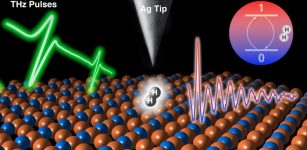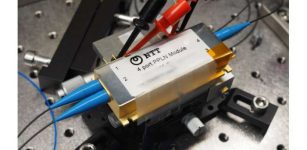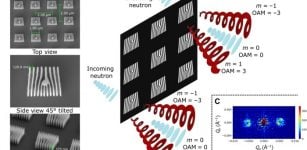Quantum Materials Designed With Quantum Computers
Eddie Gonzales Jr. – MessageToEagle.com – Designing quantum materials with specific exotic quantum properties is one of the greatest challenges in quantum technologies and material science.
Specifically, predicting the behavior of collective quantum systems pushes computational capabilities to their limit, and predicting correlated quantum materials is beyond even the most powerful classical computers, present or future.
Predicting the behavior of collective quantum systems in beyond the capabilities of ordinary computers, but not quantum computers. Photo by Jose Lado/Aalto University.
However, quantum computers can potentially tackle some of these issues. As our current quantum computers are early-stage and imperfect, a key question is how to develop algorithms that provide faithful predictions of quantum materials with near-term quantum computing resources.
The Jane and Aatos Erkko Foundation has funded a proposal that shows how imperfect quantum algorithms allow for understanding the behavior of quantum materials. The project, led by Professor Christian Flindt and Professor Jose Lado at the Department of Applied Physics in Aalto University, demonstrates a new methodology to predict the behavior of two specific families of quantum materials using near-term quantum computing resources.
‘We are developing algorithms capable of predicting phase transitions in quantum materials using imperfect quantum circuits. This methodology uses information about how a system behaves when a temperature or magnetic field is not a real number, but rather an imaginary quantity,’ Professor Flindt says.
The researchers focus on developing quantum algorithms to tackle two major problems in quantum materials: quantum spin liquids and fractional Chern insulators in two-dimensional materials.
‘Quantum spin liquids and fractional Chern insulators are fascinating states in which our understanding of experiments is severely limited by current computational methods. Understanding key aspects of realistic models will allow us to design new strategies to exploit these states in known candidate 2D materials, including TaS2 and twisted graphene multilayers,’ Professor Lado says.
Emulating quantum with classical resources
The project’s strategy is to combine both classical resources in the first stage and quantum computers in the latest stage. The researchers use a recently discovered method to simulate quantum circuits, known as tensor-network simulators, that allow emulating large imperfect quantum circuits with classical resources.
‘Tensor-network quantum circuit simulators allow us to develop and test a large-scale quantum algorithm for quantum criticality in quantum materials, emulating what will happen in a real quantum computer. Once quantum computers powerful enough are available, our algorithms will directly allow tackling quantum materials beyond any classical computer,’ Lado says.
‘In the first stages, our algorithms will run on a classical emulation of a quantum computer, as this is the most accessible resource. In the last stages of the project, given the timeline of quantum computers worldwide, quantum computers will potentially surpass the capability of classical ones. We aim at establishing one of the first demonstrations of quantum advantage in quantum materials design on a large-scale quantum computer,’ Flindt says.
The proposal comes at a time when quantum computers are emerging as feasible platforms for realistic quantum simulations. The quantum-circuit methodology provides a steppingstone for future applications to more complex quantum materials, ultimately providing a proof-of-concept demonstration of quantum computing-assisted design of quantum materials.
The project will run for two years, starting in 2023 and finishing in 2025.
Written by Eddie Gonzales Jr. – MessageToEagle.com Staff











